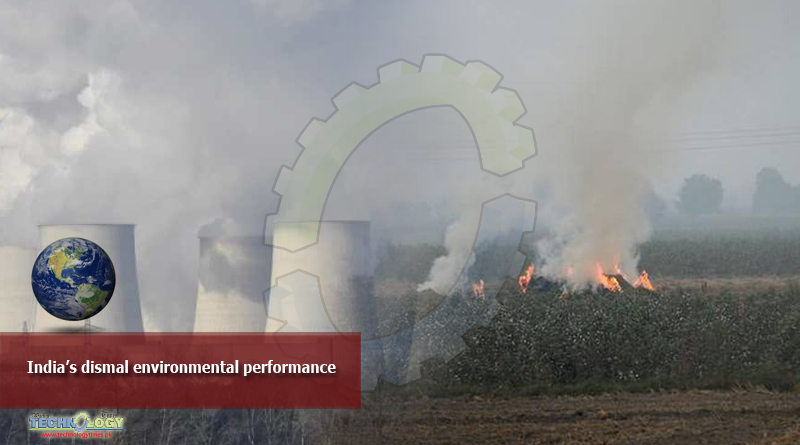India comes in almost at the bottom of the global rankings at 168th place worldwide according to the 12th edition of the Environment Performance Index (EPI 2020) released by Yale University.

Only Afghanistan (178) ranks below India in Southern Asia. Leading the region is Bhutan (107), with relatively high scores in biodiversity and habitat protection. Sri Lanka (109) and Maldives (127) are the other top three countries in Southern Asia, followed by Pakistan (142), Nepal (145), and Bangladesh (162).
Denmark comes in global first place, followed by Luxembourg and Switzerland. The United Kingdom ranked fourth. The US is far behind other industrialized nations on environmental performance and now ranks 24th in the world. With a score of 27.6 on 100, the report points out that the laggards, such as Nigeria and India, need to redouble their sustainability efforts.
India ranks the worst regionally on all five key environmental health parameters: sanitation, drinking water, air quality, heavy metals, and waste management. The report points out that India is quite far from achieving the Sustainable Development Goal (SDG) targets on the environment. Dialogues and rhetoric may exist but has not proved enough. The need is to progress towards meeting its climate targets and goals through better governance. The report’s findings show that the most crucial distinction between the worst and the best performers in the EPI has been good governance.
The researchers highlight that India struggles to perform well on several of the 2020 EPI’s environmental issue categories. India and Pakistan both rank at the very bottom of the 2020 EPI, at 179th and 180th places, respectively, for air quality. Low air quality is also a serious environmental issue in China. But it has climbed to 120th place in the EPI due to its recent pollution controls and other Environment Performance – 48 places ahead of India’s 168th overall ranking. On biodiversity and habitat, India is placed 148th in the world, mostly failing to maximize the conservation potential of its protected areas, especially its marine ecosystems.
It is also extremely worrying that the report places India 106th in the world on climate change mitigation.
In a statement the researchers said, “As one of the world’s most significant emitters of greenhouse gases, India should be applauded for recent gains in renewable energy investments. However, the data show India is not on track to decarbonize quickly enough to avoid the worst impacts of climate change. Low EPI scores for India suggest a need for national sustainability efforts on a number of fronts, including air and water pollution, biodiversity protection, and the transition to a clean energy future. EPI rankings have long highlighted the environmental challenges that India faces. India’s 168th ranking in the 2020 EPI reflects our improved knowledge about the current state of the world. Ten years ago, these same metrics would have given India a rank of 163rd in the world. The EPI finds essentially no overall improvement in India’s environmental performance over the past decade, though there are gains and losses on individual issues.”
As Down to Earth points out, the suggestions for India include re-doubling national sustainability efforts on all fronts and focusing on a wide spectrum of sustainability issues, with a high-priority to critical issues such as air and water quality, biodiversity and climate change.
The 2020 EPI provides a data-driven summary of the state of sustainability around the world. Using 32 performance indicators across 11 issue categories, the EPI ranks 180 countries on Environment Performance health and ecosystem vitality. These indicators provide a gauge at a national scale of how close countries are to established environmental policy targets. The EPI indicators provide a way to spot problems, set targets, track trends, understand outcomes, and identify best policy practices.
Good data and fact-based analysis can also help governments refine their policy agendas, facilitate communications with key stakeholders, and maximize the return on environmental investments. The EPI offers a powerful policy tool in support of efforts to meet the targets of the SDGs and to move society toward a sustainable future.
Going beyond the aggregate scores and focusing on the data to analyze performance by issue category, policy objective, peer group, and country offers even greater value for policymakers. It can assist in understanding the determinants of environmental progress and in refining policy choices.Environment
Originally Publish at: https://www.gulftoday.ae/
